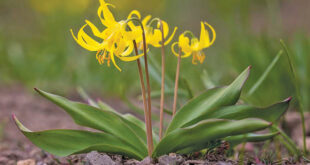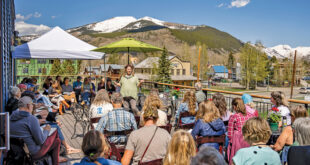Maya Silver collaborated with dad…
Almost everyone who has put the second decade of life behind them will admit that being a teenager isn’t the easiest time in a person’s life. Add cancer to the family and things can feel even more out of control for a teen. Nearly a million teenagers in this country find themselves in this situation.
Crested Butte author (and former executive director of the Office for Resource Efficiency) Maya Silver experienced that circumstance at the age of 15, a little more than a decade ago, and she wanted to share some of the things she learned from that time in her life. So the now 27-year-old Silver has written a book in conjunction with her father, Marc: My Parent Has Cancer and It Really Sucks; Real Life Advice from Real Life Teens.
The pair’s 249-page tome came out March 19 of this year, published nationally by Sourcebooks. My Parent Has Cancer and It Really Sucks is the first guide written especially for teenagers who have a parent fighting cancer. Marc, an editor at National Geographic, is also the author of Breast Cancer Husband.
“Collaborating with my dad was incredible,” related Maya. “It can be difficult to work together with someone else on a writing project but my dad and I were able to be incredibly honest with one another and trust each other’s constructive criticism. We collaborated on an outline of chapters, divided up the sections and then edited each other’s work. Google Docs was key.”
Silver said the two worked for about a year to write the book. Her dad lives in Washington, D.C. and she worked from Crested Butte. The two combined their family’s personal experience with advice from dozens of medical professionals and real stories from 100 teens—all going through the same thing Maya did.
While Maya’s mom didn’t help write the book, she was, not surprisingly, a key part of the project.
“She was the inspiration for the whole thing,” Maya said. “Without her going through this experience and winning the battle with cancer, we wouldn’t have identified this gap in resources and had the relevant experience to formulate this guide.”
The teenage years are usually a time when kids seek to find independence from the family. That comes with normal family communication struggles and conflict. Maya admits that for her personally, being a teenager and dealing with a mother going through the travails of breast cancer was not easy.
“It was a very weird experience for me—which we found is common amongst teens,” Maya said. “Many teens have a desire to be independent and pull away from the family but then cancer yanks the teen back into family life. For me, I wasn’t in denial but I never wanted to talk about it. I didn’t want to be treated differently. Many teens experience anger and resentment, which leads to feelings of guilt.”
The guide addresses various topics that affect teens during such a situation—How to have “the talk” within the family. How much should the school know and how should students and teachers deal with fluctuating emotions? What are the best outlets for dealing with stress? How can friends help…or hurt?
“Some of the topics were chosen based on comments that frequently came up in interviews, such as the difficulties with friends, school, coping mechanisms, and the like,” explained Maya. “I also used my experience to help inform the areas where a teen going through this experience would need guidance.”
As for bringing in other teens to share their experience, “We worked with cancer organizations and support groups to find teens to interview,” she said. “One pivotal group was Camp Kesem, an organization with a nationwide network of summer camps for kids whose parents have cancer. Each camp is managed by students from a local university. My dad went to a few on the East Coast and I was able to attend one through Brigham Young University in Utah. I also found some teens to survey and interview through Facebook and other personal networks.”
By bringing in the experience of other teens who went through the same struggle she did and chronicling the wisdom gained from each in this book, Maya hopes she can perhaps benefit those adolescents who might not yet even know they will have to deal with something outside the expected bounds of typical teenage years.
“The year of writing was definitely an interesting time for me,” Maya summarized. “I don’t think I had ever spent so much time coming to terms with and reflecting on my mom’s cancer. I was sort of in denial when it was happening and was more than happy to forget about it when she fortunately beat breast cancer. So it was good for me to reflect on my experience and really process what went through my teenaged head at the time.”
Those insights might now make another teen’s journey a little easier.
As for her mom, Maya said, “After surgery, chemotherapy and radiation treatment, she beat cancer and has had no recurrences since.”
The book is available on Amazon, at Barnes & Noble and at bookstores and other online retailers nationwide.
 The Crested Butte News Serving the Gunnison Valley since 1999
The Crested Butte News Serving the Gunnison Valley since 1999



